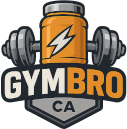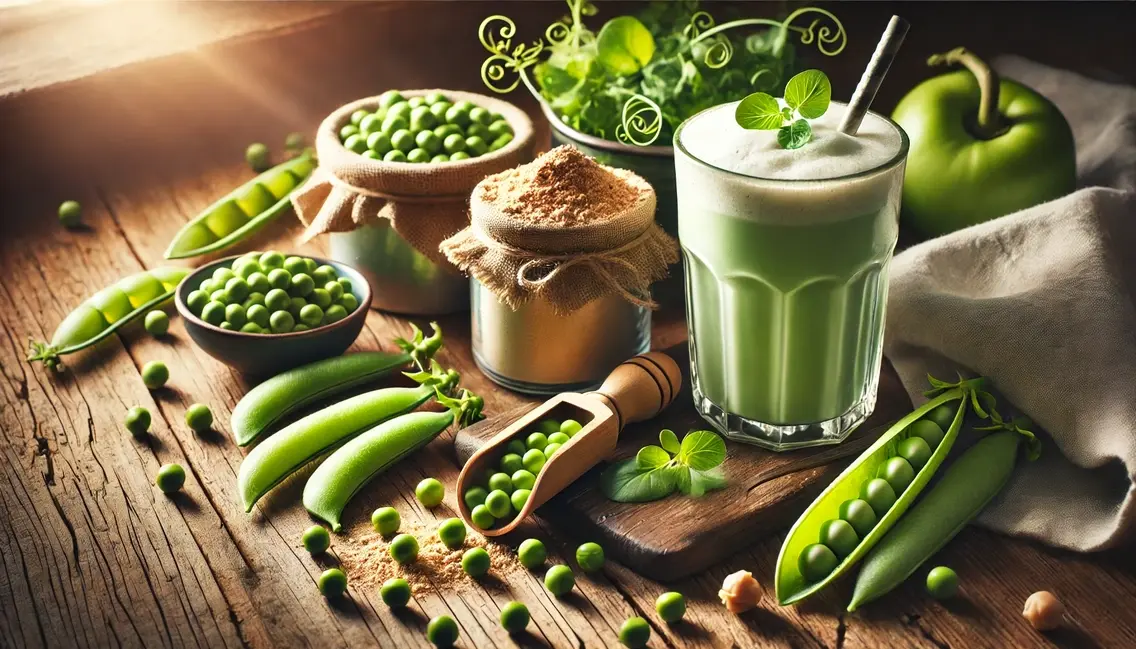Pea Protein: The Plant-Based Secret to Boosting Your Fitness
Imagine a world where your protein source not only powers your workouts but also aligns with a sustainable, plant-based lifestyle. Meet pea protein, the increasingly popular champion of the health-conscious community. Derived from humble yellow split peas, this plant protein is more than just a dairy alternative; it's a nutritious powerhouse that supports muscle growth while being kind to your digestive system. But does it really hold up against traditional protein heavyweights?
Unlike some protein sources that come with unwanted baggage, pea protein is rich in essential amino acids, particularly arginine, which plays a crucial role in muscle performance and recovery. According to the National Institutes of Health, it's a stellar choice for anyone seeking to maximize their workouts without compromising on nutrition. And the best part? Pea protein is shown to potentially possess anti-inflammatory properties, as indicated by recent studies, dismissing the fear of it being the cause of inflammation.
However, there are some puzzling myths and truths that surround pea protein. Is it truly viable for building muscle? Could it pose the same digestive challenges as its competitors? And what about its completeness as a protein source? We'll tackle these questions head-on and decipher why pea protein might just be the game-changing addition your training regimen needs.
In this exploration, we'll uncover the facts, debunk common misconceptions, and guide you to selecting the best pea protein that fits your lifestyle perfectly. Whether you're a seasoned gym-goer or just starting on your fitness journey, this article might transform the way you perceive plant-based nutrition. Let's delve into the science behind this rising protein star and discover why pea protein might be your next go-to supplement.
Health Benefits of Pea Protein
Pea protein is becoming increasingly popular as a plant-based protein source, offering substantial health benefits and nutritional value. Its versatility and general tolerability make it an excellent choice for vegans and those with dietary restrictions.
Key Health Benefits
- Supports Muscle Growth
Pea protein is rich in essential amino acids, particularly arginine, which plays a crucial role in muscle repair and growth. Its high digestibility and light nature offer a reliable option for anyone looking to build or maintain muscle mass effectively.
- Allergy-Friendly Alternative
As a non-dairy option, pea protein suits individuals who are lactose intolerant or have allergies to dairy proteins like whey. It provides a protein-rich alternative without the common allergens associated with dairy products.
- Potential Anti-Inflammatory Effects
Research, such as studies published in the Journal of Agricultural and Food Chemistry, suggests that pea protein may have anti-inflammatory properties, thereby contributing positively to overall health.
- Supports Cardiovascular Health
Pea protein's high arginine content aids cardiovascular health by supporting blood flow and heart health. It enhances nitric oxide production, which relaxes blood vessels and improves circulation.
Embracing Pea Protein for Optimal Nutrition
Pea protein stands out as a nutritious and versatile plant-based choice, supporting muscle growth and cardiovascular health while offering an allergy-friendly alternative for those with dietary restrictions. Balancing pea protein with other sources ensures a complete amino acid profile.
For those keen to enjoy these benefits daily, consider fueling your day with LEANFIT Organic Plant-Based Protein. This blend of five organic plant proteins, including pea, rice, chia seed, flax seed, and hemp, offers a comprehensive amino acid profile that can make integrating pea protein into your diet both simple and effective.
Dietary Sources of Pea Protein
Pea protein, derived from yellow split peas, serves as a great plant-based protein source, high in essential amino acids and suitable for various dietary needs. Ideal for those seeking alternatives to animal-based proteins, pea protein is beneficial for muscle growth and overall health.
Natural Sources of Pea Protein
The primary source of pea protein, yellow split peas, are rich in protein and can be consumed in various forms. They are especially valued for their high arginine content, which supports cardiovascular health. However, obtaining sufficient protein purely from yellow split peas may be challenging due to the quantities required to meet daily protein needs.
This form of pea protein is made by isolating the protein from yellow split peas, resulting in a product with a higher protein concentration and reduced carbohydrate and fat content. It is often used in protein shakes and bars. While convenient, pea protein isolate requires processing, which might not appeal to those aiming for whole food consumption exclusively.
Made by grinding yellow split peas, pea flour retains more fiber and can be used in baking and cooking to boost protein content in meals naturally. Despite its versatility, the protein content in pea flour may still require supplementation for those with higher protein demands.
The Challenges of Meeting Protein Needs Naturally
Meeting protein requirements from whole food sources like yellow split peas or pea flour alone can be difficult, particularly for those with higher protein intake needs or dietary restrictions. Although rich in essential nutrients, these sources often require large quantities to achieve sufficient levels, posing a challenge for those with busy lifestyles or specific dietary goals.
For those seeking a more efficient solution to meet their daily protein needs, consider enriching your diet with a more concentrated protein source. Fuel your day with LEANFIT Organic Plant-Based Protein – a blend of five organic plant proteins including pea, rice, chia seed, flax seed, and hemp, providing a complete amino acid profile! This product offers a convenient and effective way to support your nutritional goals.
Incorporating Pea Protein Sources
To effectively incorporate pea protein into your diet, consider using pea protein isolate in shakes or smoothies and adding pea flour to baked goods. By pairing pea protein with grains or other protein sources, you can ensure a more complete amino acid profile. In the next section, we will explore the recommended intake levels of protein and how pea protein can fit into a balanced diet.
Daily Intake for Pea Protein
Pea protein is a well-regarded plant-based protein celebrated for its high content of essential amino acids and its ability to aid muscle growth. It offers a fantastic alternative for those who are lactose intolerant or have a dairy allergy. Vegans and vegetarians, in particular, find it an excellent supplemental protein source.
Recommended Daily Intake
While there's no set dietary recommendation specifically for pea protein, understanding overall protein needs is crucial:
- Adults:
Protein requirements range from 46 to 56 grams daily, influenced by factors like age, sex, and activity level.
- Athletes or Very Active Individuals:
These individuals often require 1.2 to 2.0 grams of protein per kilogram of body weight each day to support increased energy and muscle repair demands.
- Vegetarians/Vegans:
Given the various bioavailability levels of plant proteins, a slightly higher intake might be advised to ensure adequate protein from diverse sources.
Consistency in protein intake is essential because it maintains muscle health, supports metabolic functions, and helps repair body tissues. Ensuring you're consuming enough protein daily contributes significantly to overall health and well-being.
Including Pea Protein in Your Diet
Incorporating pea protein into your nutritional regimen can be achieved by adding it to smoothies, using it in baking, or enriching meals. Combining pea protein with other plant-based proteins or foods, like grains or legumes, can help form a complete amino acid profile, offering a balanced nutritional intake.
For those striving to meet their daily protein needs smoothly, Fuel your day with LEANFIT Organic Plant-Based Protein, a blend rich in organic plant proteins such as pea, rice, chia seed, flax seed, and hemp. This diverse mix provides a complete amino acid profile, supporting your journey towards adequate nutrition.
Maintaining proper protein levels is integral not only to prevent deficiency symptoms but also to enhance your body's ability to function optimally.
Deficiency of Essential Amino Acids in Pea Protein
Pea protein is a popular plant-based protein source, appealing for its sustainability and digestibility. However, it falls short in terms of offering a complete amino acid profile. This shortcoming can potentially lead to significant health implications due to deficits in certain essential amino acids.
Deficiency Symptoms and Consequences
- Incomplete Amino Acid Profile
While favored by many for its plant-based nature, pea protein lacks sufficient quantities of some essential amino acids, particularly methionine. This can result in suboptimal protein synthesis, adversely affecting muscle growth and repair, especially if pea protein is the primary source of dietary protein.
- Compromised Metabolic Functions
If methionine levels are insufficient, the body's ability to synthesize critical compounds such as creatine and certain neurotransmitters may be impaired. This can influence energy levels and cognitive performance, leading to decreased vitality and mental clarity.
- Inadequate Tissue Repair and Maintenance
Without a balanced intake of essential amino acids, the body may struggle with effective tissue repair and collagen production—key elements for maintaining healthy skin and joints. This deficiency can manifest as delayed healing and increased susceptibility to skin and joint issues.
Maximizing Pea Protein Benefits
To mitigate the limitations of pea protein, it is wise to combine it with grains or nuts, complementing its amino acid profile to achieve nutritional completeness. Another practical approach is to incorporate a comprehensive protein supplement into your diet. Fuel your day with LEANFIT Organic Plant-Based Protein – a blend of five organic plant proteins including pea, rice, chia seed, flax seed, and hemp, providing a complete amino acid profile. This strategic mix allows individuals to relish the benefits of pea protein while ensuring all essential nutrients are fully available to maintain robust health.
Curious about more common misconceptions and practical concerns regarding pea protein? Stay tuned as we delve into frequently asked questions and learn how to choose the right protein source wisely.
Conclusion
As you weave pea protein into your nutritional fabric, you're not just making a dietary choice—you're embracing a paradigm shift in how we view plant-based nutrition. It's not just about meeting protein needs but about aligning them with a broader understanding of sustainable health and well-being. Imagine a workout powered by not just any protein, but by a source that champions both your physical goals and a commitment to mindful nutrition.
Think of pea protein as an invitation to rethink and refresh your fitness journey. How will you integrate this plant-based wonder into your daily routine? Perhaps it's time to shake things up with your morning smoothie, or maybe you'll experiment with baking, ensuring each meal aligns with your health aspirations. Could pea protein be the catalyst for a broader embrace of plant-based living in your life?
As we explore these possibilities, let's not forget the power of sharing. Why not extend this knowledge beyond personal borders? Engage in discussions with your gym buddies, spark a conversation at the next community potluck, or tag someone who might appreciate this plant-based powerhouse. After all, good health thrives in community and conversation.
Every step towards incorporating pea protein is a step towards optimizing your nutrition with intention and insight. Remember, the choice to fuel your body wisely is both a privilege and a responsibility. So, as you consider your next meal or workout supplement, think of it not just as a part of your diet but as a crucial building block in your holistic health journey. The path to peak fitness is clear, and it all starts with that next scoop, shake, or bite—are you ready to redefine your protein story?

